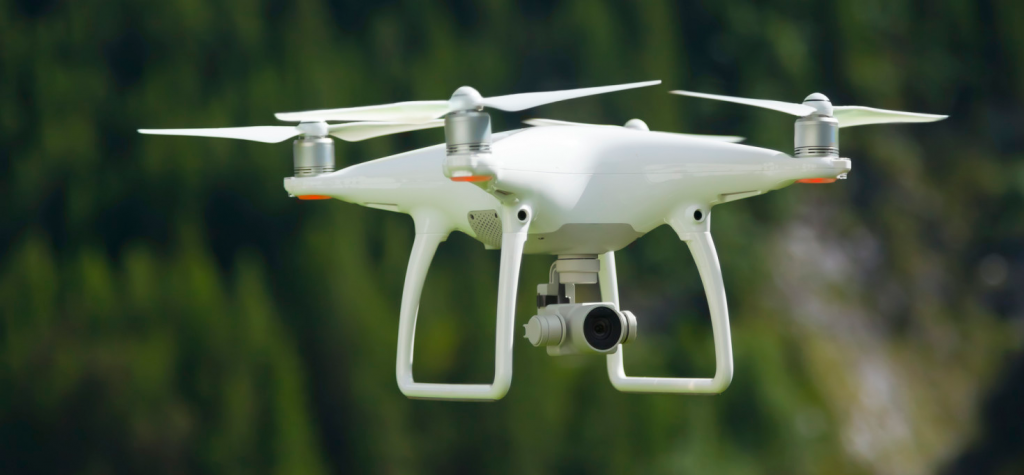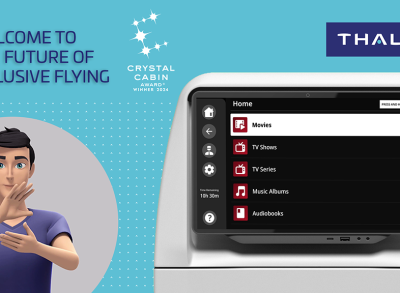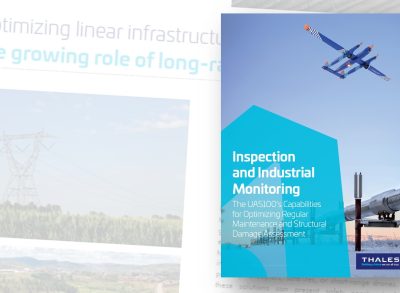The irresistible attraction of the drone

Thales is well aware of the potential of unmanned systems and has come to play a key role in the development of the drone industry in recent years. The Group takes a keen interest in the latest ideas and proposals from a whole range of companies and in many cases has invested in them itself.
Innovate or die
"To succeed in the drone industry, you have to be innovative and differentiate yourself from the rest of the field. If you don't innovate, you disappear," says Jean-Marc Grolleau, who has led the Aetos cluster for nearly six years and experienced first-hand the realities of this fledging industry.
The regional council of Nouvelle-Aquitaine has been a pioneer of the French drone industry. Back in July 2010, two years before drones were authorised to fly in French civil airspace, the council put its weight behind Aetos, the country's first high-tech cluster for drone systems and services, alongside industry partner Thales. That decision has been instrumental in the development of a whole industry, which now includes some 80 companies and institutes across the region.
The cluster has brought stakeholders together to get the industry off the ground and make Nouvelle-Aquitaine a major hub in the French drone ecosystem. And today, the cluster has expanded its influence well beyond the region's borders. Since 2012, when regulations on drone usage were officially approved by the French civil aviation agency (DGAC), the regional industry has gone from strength to strength and is now recognised at both national and international levels as a force to be reckoned with.
Training is one of cluster's core objectives and this commitment to supporting future generations of drone professionals is one of its major strengths: "The drone industry is entering a new dimension," says Jean-Marc Grolleau: "The future of the drone belongs to digital natives, young people have grown up with digital technologies."
Science fiction becomes reality
Hollywood started the ball rolling, transporting audiences to worlds that seemed completely abstract and unreal. Engineers and industry players took the fiction and turned it into reality, developing smart objects and robots with artificial intelligence that now offer a glimpse of how our day-to-day lives will look tomorrow.
And drones are part of the revolution. Key sectors such as construction, industry are agriculture are using drones for tasks ranging from building inspection to site security and crop farming. Thales's first civil drone project dates back to 2011, when the Group was involved in the CARUS programme (Cooperative Autonomous Reconfigurable UAV Swarm). "The idea was to demonstrate that drones could work autonomously and that a fleet of drones could reconfigure itself automatically if one aircraft encountered a problem. It was one of the first times a swarm of drones had been tested," says Grolleau. "Meanwhile, Robotics Industry, based near Bordeaux, was developing Droneo, an unmanned surface vehicle designed to map the seabed, analyse water samples and monitor sediment levels in ports and lakes."
Express delivery
Professional delivery services also have a vested interest in the development of the drone industry. At the 2017 Paris Air Show, the Nouvelle-Aquitaine region unveiled PELICAN (Projet d’Etude de Livraison Aquitaine), a collaborative research project by Thales, Air Marine, Cdiscount, Serma Technologies and the Bordeaux-based laboratory IMS to develop drone-based delivery of packages of up to 5 kg in urban areas.
The objective is to deliver customers in record time — an hour or two after they place an order — and in an environmentally acceptable way. Instead of home deliveries, PELICAN will make direct shipments from Cdiscount's warehouses to pick-up points all over the Bordeaux area, where customers can collect their packages.
As well as the technical challenges, safety is clearly a key consideration: the level of risk considered "acceptable" needs to be even lower than in civil air transport. The first test is planned for later this year, with a prototype system due to be built in 2019. Thales will be providing it aerospace expertise, combining tried and trusted engineering solutions with an in-depth understanding of the stringent national and international regulations involved. "We will be applying the same technologies and methodologies as we use in the aerospace industry, and designing appropriate architectures based on comprehensive analysis of all the risk factors," explains Jean-Marc Grolleau.
PELICAN will fly fixed routes, just like airlines, and the project will fit into the European U-space vision, which aims to enable low-level drone operations, particularly in an urban context. The drones will rely on the same sort of software as other aerospace applications, as well as high-precision navigation (geofencing) and cybersecurity technologies, picking up and dropping off packages in places that cause the least disruption, and keeping noise levels to a minimum.
Downtown drones
The transport industry is also keeping a watchful eye on drone developments, recognising the potential of unmanned aircraft to relieve traffic congestion in urban areas. This is the focus of the Drone City initiative. Launched by the Nouvelle-Aquitaine region with the Aetos cluster, the DGAC and the Cerema, the project aims to become the centre of gravity for France's research into the use of drones in downtown areas. It promotes closer cooperation between industry stakeholders (technology providers, airframe manufacturers, operators, research institutes, etc.) through a range of collaborative projects, addresses societal changes by developing new services and uses for drones in cities, tests new concepts in real-world conditions and has a role to play in shaping the regulatory framework for drone operations in urban areas.
And the adventure has only just begun. In February, Airbus announced the maiden flight of its self-piloted electric taxi drone. Meanwhile in China, the start-up Ehang became the world's first company to fly a prototype passenger drone with actual humans on board. Major hurdles still need to be cleared, of course, such as integrating passenger drones in civil airspace and automating airspace management — not to mention gaining public acceptance for this new urban mobility option. But the attraction of drones has never been stronger, and the industry is better equipped than ever to meet the challenges ahead.
“
To succeed in the drone industry, you have to be innovative and differentiate yourself from the rest of the field. If you don't innovate, you disappear.”
Stay connected with us...
Find us on Twitter @ThalesAerospace, on our official Youtube channel Thales Aerospace and on LinkedIn Thales Aerospace.




